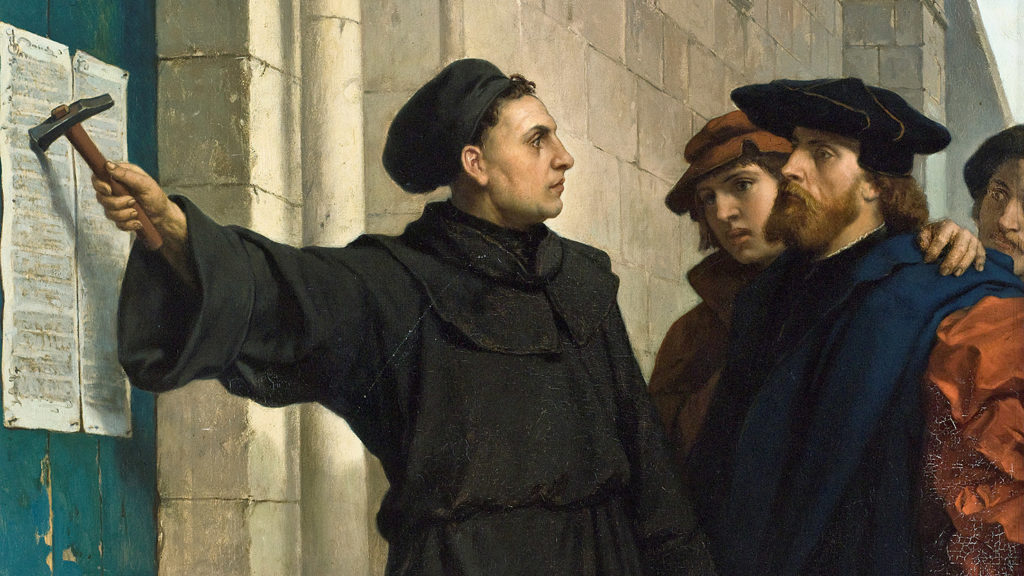
What sort of event can spark a debate that lasts more than five centuries? Martin Luther’s posting of the 95 Theses in October 1517 can — and the “Reformation at 500” lecture series is getting a head start on the commemoration of this central moment in Reformation history.
Visiting lecturer Ryan Reeves and a group of Hillsdale College theology, religion, and history professors opened up the semester-long discussion Sept. 18 and 19 with a focus on an issue that is often considered central to the 16th-century strife in the Roman Catholic church: justification and salvation.
“When a group of faculty from various traditions began to meet last spring, we agreed on two things: that this year does mark the 500th anniversary of the Reformation — we’re historians, not mathematicians — and that the discussions between Catholics and Protestants on this campus are not always as rigorous, critical, and historically grounded as they really ought to be,” Chaplain Adam Rick said to an audience of about 100 in Phillips Auditorium. “So we agreed on a third thing: that the 500th anniversary of the Reformation was as good a chance as any to clear the decks a bit and inject the conversation with some light.”
Assistant Professor of Theology Jordan Wales set the scene with a history of understandings of grace before Luther, especially in Augustine and Thomas Aquinas, who saw justifying grace as a relationship with God.
“The theology of grace has been distilled and refined, but it has not stood unchallenged,” Wales said.
The next speaker, Ryan Reeves, a professor of historical theology at Gordon-Conwell Theological Seminary and creator of a respected YouTube channel centering on church history and theology, asked the provocative question, “Did Luther Understand Grace?” The answer — considered in light of Luther’s context and understanding of multiple readings of the term “justification” in late medieval theology — was “yes.”
“Luther was totally allergic to all the ways we think we’re doing [justification] ourselves and forget grace,” Reeves said. “In that way, he got it right.”
Justification and sanctification, issues that led theologians and reformers in such widely divergent directions, were actually more flexible in the late Middle Ages, and Luther sought assurance on the belief he found central to faith: justification.
If debates stem from “terminological confusion,” as Reeves said, does that mean the centuries-long debate could be simply a matter of defining our terms and finding common ground? The drafters of the Joint Declaration of 1999 seemed to think they had solved this problem when they signed a statement that claimed Catholics and Protestants agree on the essentials regarding justification.
But in the third lecture in the series, Associate Professor of History Korey Maas said that claim may skim over some important remaining differences.
“The declaration doesn’t clarify existing confusion about terms, and it changes the meaning for accepted terms,” Maas said. This could lead not to agreement, but to further confusion about what important doctrines mean for different church groups.
Students and audience members stored up their questions for a panel discussion at 7 p.m. with all the presenters, as well as Associate Professor of History Matthew Gaetano, religion and philosophy deparmtent chairman Tom Burke, and Assistant Professor of Religion Don Westblade.
The first question was about free will and predestination, a topic closely related to Augustine’s theory of grace (in case anyone still thinks Hillsdale students don’t think big). The second was about Luther’s view on grace and the immutability of God, from junior Ellen Friesen, a history major who is taking classes on Patristic Theology and the Reformation this fall.
“I have a lot of questions still, and I’ll definitely be going into office hours and emailing Dr. Reeves,” Friesen said. “But I think I appreciated the spirit that the talks embodied even more than the content. They were honest about what they believed and were willing to discuss it.”
This spirit was evidence of a search for unity without sacrificing the beliefs of individuals and church bodies, Friesen said.
“Acts says that the community of believers was one in mind and heart. Dialogue like this answers the question: Are we one in mind? Do we confess the same things?” Friesen said. “To say the doctrine doesn’t matter stops all dialogue. But to neglect striving for unity is an issue of the heart. And that’s where prayer comes in.”
The “This Far By Faith” lecture series will continue Oct. 17 and 18 with a focus on piety and the sacraments, and Nov. 30 and Dec. 1 with a discussion of Christian authority and Scripture.
“Our only request for you is that you come ready to learn. Engage deeply. Ask hard questions. Assume good faith. Wrestle. Critique. Learn,” Rick said. “We realize we come to these conversations with convictions of our own, and that’s okay. Our goal isn’t to change minds or self-congratulate. Whether you are Protestant, Roman Catholic, or none of the above, it is our hope that you will find your own mind strengthened and refined.”

